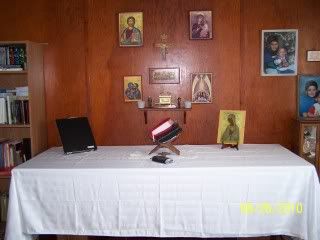Fr. Nicolas Schwizer

In the era of the first Christians, all church life developed in the homes since there were no temples as such. The entire family would convert and would form part of the Church. Today, we once again become aware of this very important reality. Through baptism and the sacrament of matrimony, Christ himself is present in each Christian home, and from there carries out his saving task: He heals, blesses, transforms, guides and educates his people on their way to Salvation.
In the Second Vatican Council document, we read: “in this type of domestic church, the parents should be – for the children – the first preachers of the faith through the Word and example, and should foster the sacred vocation” (Lumen Gentium, II).
Our first church experience is our very own home. There we learn to believe, to love God and our brothers and sisters. There we develop as persons. In the bosom of the home we find God who dwells in our midst. Through baptism, we participate in the prophetic, priestly and real mission of Christ; through the sacrament of matrimony, we participate as a couple, and Christ himself acts through us, sanctifying our family.
Both the father and the mother participate in the teaching, priesthood and shepherding of Christ. They are the first catechists and formers of the Christian faith.
The Church, in its magisterial (teaching) function, has the mission to transmit the faith, to watch over the traditions and truths of the Church. Christ has revealed to us the truth about the Father and has shown us the significance of man himself.
This has been secured throughout the centuries by means of the traditions which cultivated and helped to bring the aforementioned Christian truths to life. It is our task as families “to watch over” so that our children grow in the aforementioned tradition and are able to continue it.
Since our children are constantly bombarded by a secularist and not very Christian environment, today, more than ever, we need clarity in regard to Christian truths and customs. We want to be catechists, educators in the values and Christian customs for our children. Thus the question as to how much time we dedicate to our catechist formation.
What is not known, is not experienced and cannot be taught. A great problem is religious ignorance which has caused the proliferation of innumerable Christian and non-Christian sects which slowly undermine our faith.
The family – today more than ever – has a fundamental role in the transmission of the faith. It would do us good as a couple to take the catechism and begin to read together the parts which interest us most. It would have to transform itself into our “kill the donkeys.”
We could also ask ourselves how we cultivate our love for the Church in our home: reading God’s word, our conversations concerning the faith, how do we make use of the catechism times for our children’s confirmation and first communion.
Our challenge is to conquer our legacy. We have to take into the future what we have inherited from our grandparents. What did they leave us? What you have inherited from your parents, make it your own so that you may truly possess it.
May those valuable goods of the Catholic faith become our intimate and most personal possession; otherwise, nothing will be secure in us nor in our family, nor will we be prepared against the worldly and demonic spirit.
Questions for reflection
1. Do we keep up with the catechism of our children?
2. Am I a Christian because of custom, tradition?